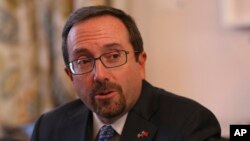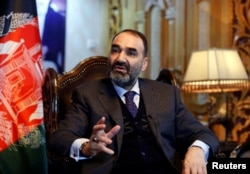The United States again has called on leaders in Afghanistan to resolve peacefully and expeditiously an ongoing dispute over the leadership transition in a northern province, where the powerful governor is refusing to relinquish control despite being ousted by the country’s president.
The political crisis started a month ago when Afghan President Ashraf Ghani removed longtime governor of Balkh province, Atta Mohammad Noor, and appointed his successor.
But Noor, who has governed the relatively peaceful and prosperous Afghan province since 2004, has since refused to leave the post unless the central government met certain conditions his Jamiat-e-Islami party has put forward. His party is a vital partner in the Ghani-led national unity government.
Speaking to reporters in Kabul, U.S. ambassador John Bass noted the Afghan constitution empowered the president to appoint provincial governors and urged both sides to respect the rule of law while finding a solution to the crisis.
“We believe it’s essential that this dispute and the transition from former governor Atta to a new governor occur peacefully. There is no place for additional violence in this society, and particularly violence that would flow from a political dispute about who the governor of the province is,” said Bass.
Ousted governor Noor has been demanding, among other things, the authority to appoint his successor and the provincial police chief.
While addressing supporters Wednesday in the provincial capital of Mazar-e-Sharif, Noor threatened that if his party’s ongoing negotiations with President Ghani’s office failed to produce an agreement, he would launch a nationwide “rebellion” to “smash the walls of hostility and anger.”
Noor was responding to reports the central government might resort to use military force to break the stalemate, and he did not elaborate. But in a public speech earlier his month, the controversial governor claimed that “70 to 80 percent” of Afghan soldiers would not fight him if the government were to proceed with the use of military power.
“There is enough violence, there is too much violence in this society and there are too many conflicts that this government and provincial authorities and citizens are already dealing with. The last thing Afghanistan needs right now is more violence,” the U.S. ambassador noted while speaking Thursday.
Bass went on to say the political tensions are only benefiting terrorists and enemies of Afghanistan.
Earlier this week, U.S. Vice President Mike Pence also telephoned Ghani and emphasized Washington’s support for the Afghan government to engage with Noor and peacefully negotiate the leadership transition in Balkh.
Observers say the political confrontation could refuel traditional ethnic rivalries in Afghanistan, undermining national counterinsurgency efforts and posing challenges for next year’s presidential election .
Noor’s party mainly draws its support from Dari-speaking ethnic Tajiks, while Ghani represents the majority Pashtun community. The Afghan president is accused of favoring his own ethnic group, charges Ghani’s advisers reject.
Afghan Chief Executive Abdullah Abdullah and Foreign Minister Salahuddin Rabbani represent Noor’s party in the central government in Kabul.
Party sources have confirmed that political tensions prompted Rabbani not to travel to New York for Friday’s U.N. Security Council meeting on Afghanistan and stay in the country to try to resolve the dispute.
Afghan forces in partnership with U.S.-led international troops have intensified operations against the Taliban and other militant groups since President Donald Trump announced his new South Asia strategy in August seeking to contain insurgent gains.





